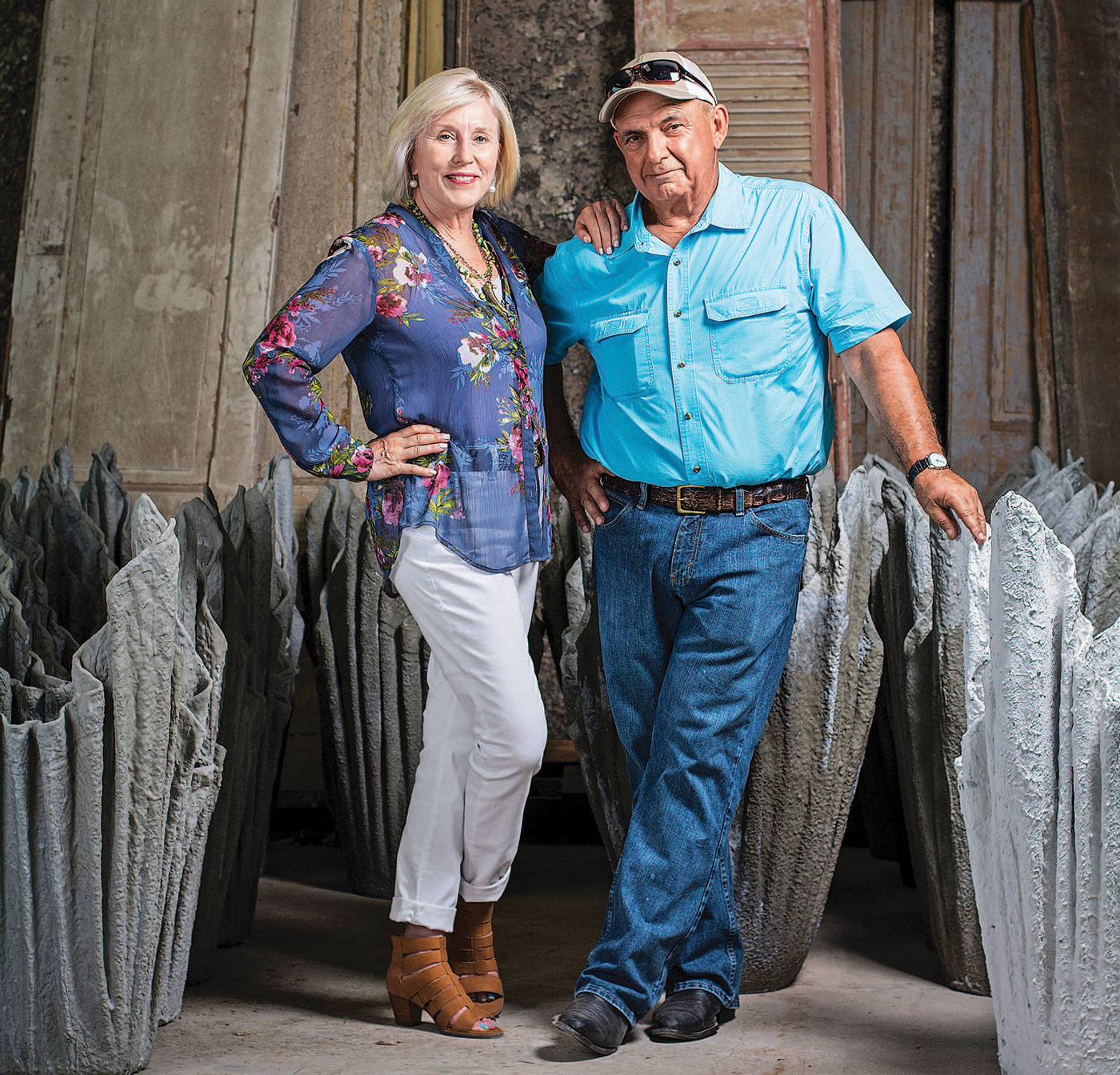
Whether curating, buying, making, or selling items for the home, Paul Michael and his hard-working family have established a legacy of unique design and artful deals.
Not that you’d guess it at this moment — and not that he’d agree — but the guy under the cool round table is a retail rock star. Dressed in black boots, jeans, and a smart blue-on-blue houndstooth jacket, Paul Michael is crouched down in a showroom at the Dallas Market explaining where he found and how he fashioned every part of his own take on a 19th-century parlor table, down to the pedestal’s lion’s paw feet, which he had reproduced based on an antique from Poland.
Watching and listening, you get the fascinated impression that no bridge is too far in finding, creating, curating, buying, and selling for this self-admitted black sheep whose rebellious early life didn’t necessarily indicate he’d become a business success and influential tastemaker. But he’s both. His four thriving stores — the flagship in Canton, Texas; his base of operation and creation in his hometown of Lake Village, Arkansas; one in River Ranch in Lafayette, Louisiana; and another in Monroe, Louisiana — showcase home décor items whose quality and affordability put the good and beautiful life within reach for a growing fan base.
There’s evidence everywhere of Michael’s impeccable taste and unerring eye. The smooth-as-silk sycamore slab banquet table with the Lucite panel legs. The soft hair-on-hides speckled with elegant gold foil spots. The brass Sputnik pendant lamps bursting with polished quartz slices. The glass cube occasional tables that open for display items. The oversize château cabinet with distinctive antique iron hardware. The big rusty receptacle made from an ornate wrought-iron fence. The impactful art — from Picasso-like paintings to African graphics — on every wall.
You can turn over tags to see prices for all these things, but what’s actually on offer here is a ticket to enjoying life. It’s all about Paul Michael’s personal touch.
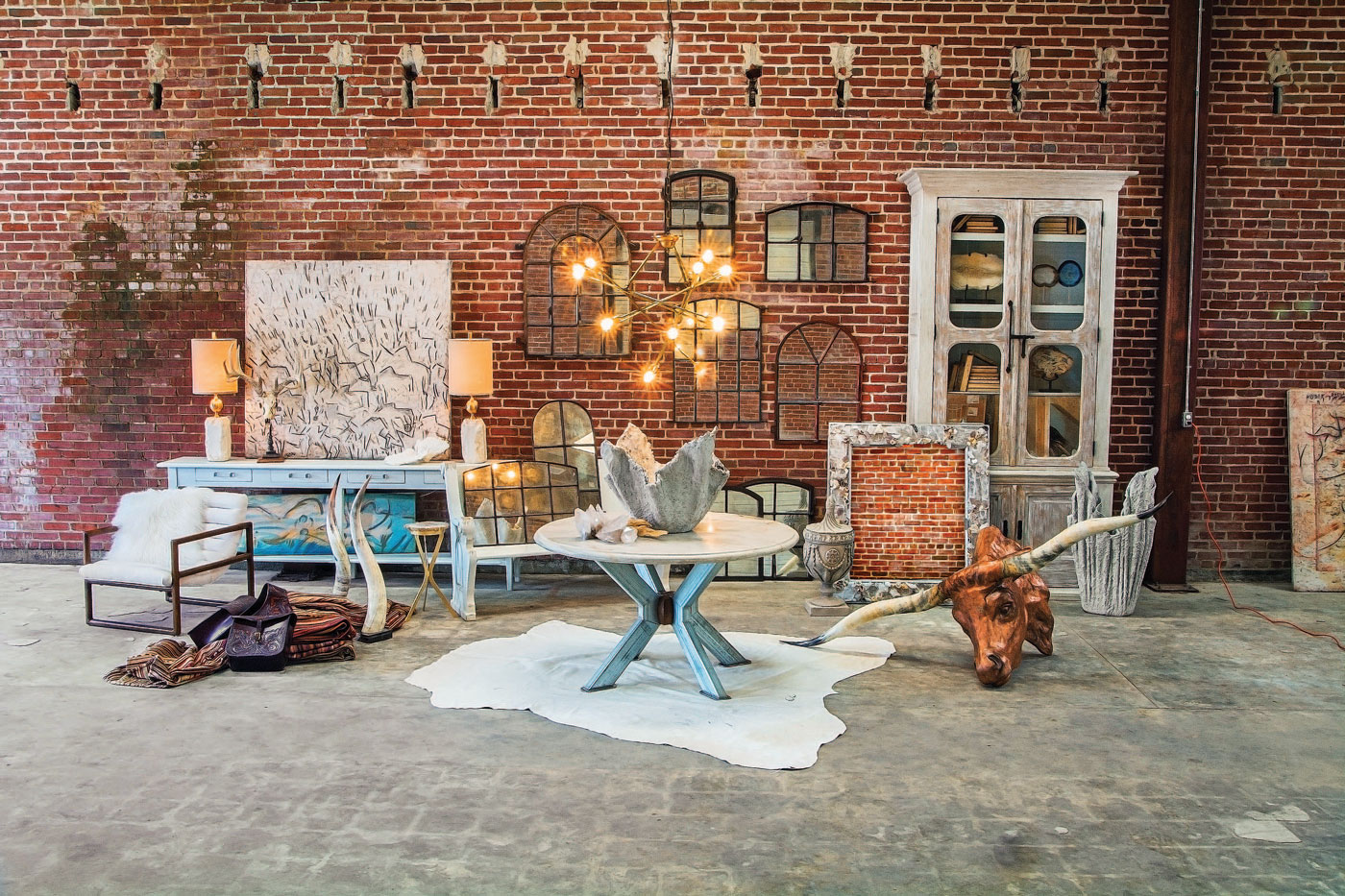
One of the best places to experience his personal philosophy writ large is the new Market Hill by Paul Michael in the twice-yearly antiques Mecca of Round Top, Texas. There Michael has gathered his own wares and 19 of his favorite vendors in an architecturally significant building of his own design — a destination unto itself of indoor air-conditioned shops and outdoor covered breezeways, beaucoup parking, loading and unloading zones, and an on-site restaurant that serves up a nice glass of wine and a darn decent lunch and evening meal to cap off a day of hardcore treasure hunting. It’s 130,000 square feet of the look and feel of living life to the fullest, filled with the best quality affordable antiques and decorative arts a hard-earned buck can buy.
It’s probably his best — and certainly his biggest — example of a preternatural gift for sizing up a situation and getting creative with it. “We were going to Round Top to buy antiques for our stores,” Michael recalls. “I could see what was going on there, and it rang a little bell. There was a super-high-quality clientele buying and spending lots of money, but the facilities and accommodations weren’t up to it.”
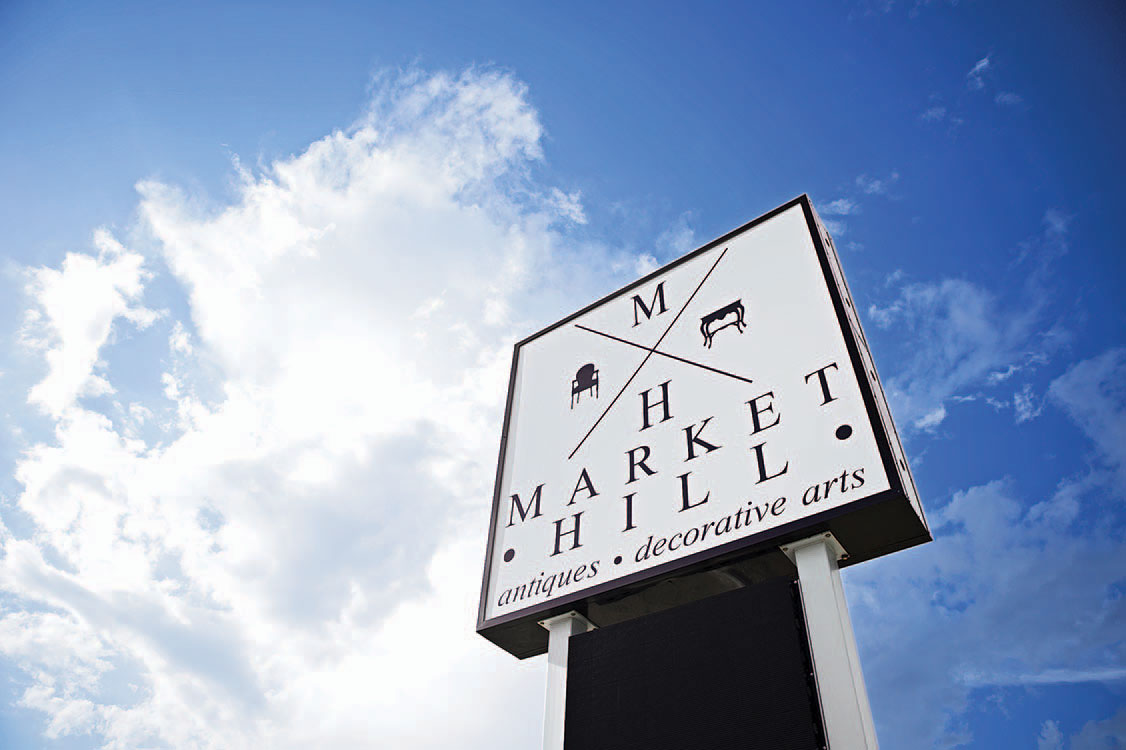
Part of the charm of Round Top might have been the heat and the dust and the we’re-all-in-this-together-waiting-for-a-port-a-potty, but Michael saw an opportunity to elevate the experience. And the timing was right: “We had a rice farm in Arkansas that we’d paid off. We decided to sell it and take the money and build a first-class place in Round Top to showcase the things we’re making and selling.”
The we Michael’s referring to is his wife and “50-50 partner” in all things, Debbie. Sitting next to him in a casual chic black shift and white Angora wrap, she nods along with her husband’s recollection of how their latest entrepreneurial leap of faith came to be. “We sort of stumbled into it all,” she says. “There’s not a part of our married life that’s been planned. We’re good at reacting to things. We evolved into this, and we just never tire of the excitement and fun of doing it.”
Paul and Debbie Michael are heart-and-soul people, and, not surprisingly, Market Hill by Paul Michael is a heart-and-soul project — a full-circle culmination of their relationship and shared career that not coincidentally began in dusty flea markets.
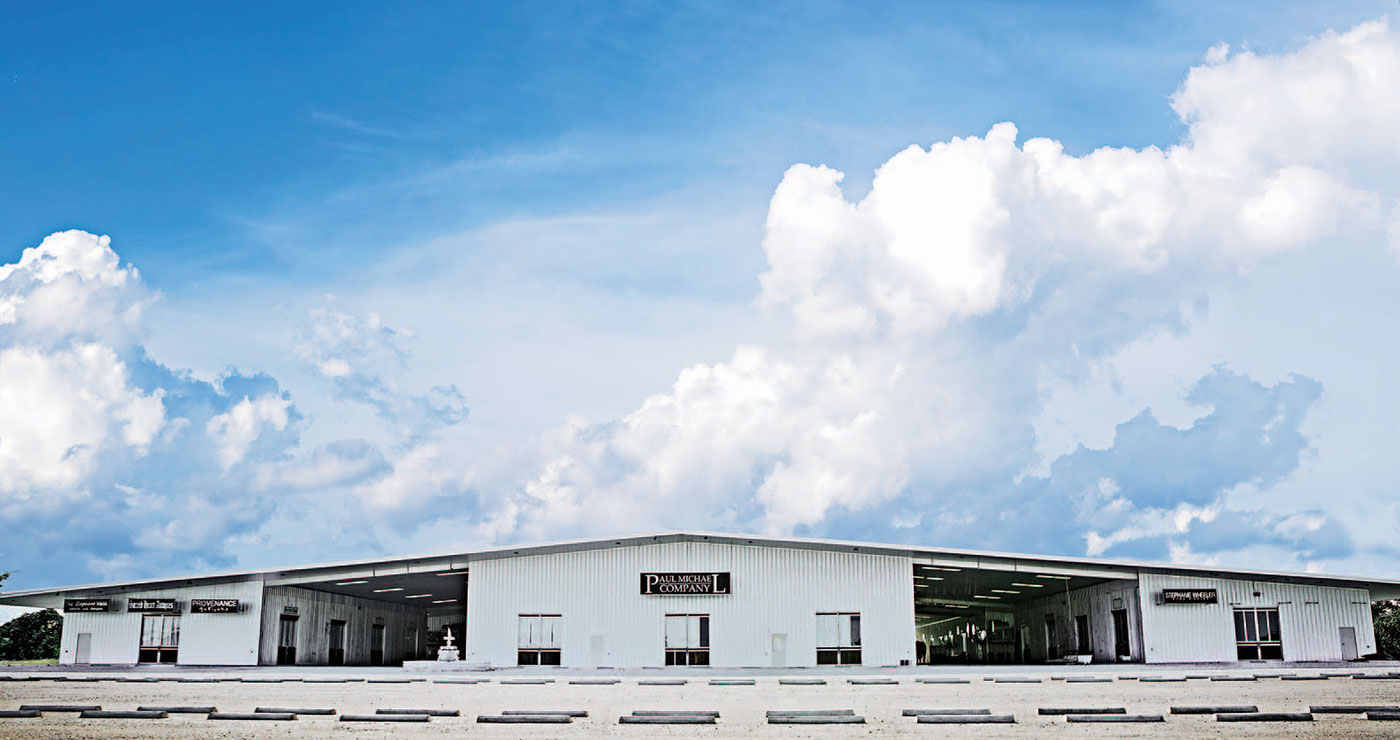
“He found me in a flea market in Nashville,” Debbie says. At the time, she had a shop in Music City on Elliston Place near Exit/In, where she was “buying and selling antique quilts and was the first to sell antique clothing.” Her vintage pieces were finding their way to concert stages and album covers. He was busy buying and selling on the Nashville-Memphis-Canton flea market circuit. “He’d be my late date,” Debbie
remembers. “He’d say, ‘I’ll be there at midnight. Wait for me.’ ” She did, and they’ve been together picking, creating, raising a family, and building the business ever since.
It wasn’t always clear that Michael would find his way, especially during his deep-inhale hippie days in the 1970s. But when the smoke finally cleared, he embraced his buying-and-selling birthright. “I grew up in a family department store,” says Michael, the only boy in a family of four sisters whose influence he credits with honing his instincts for décor. “I had an aunt who was a supreme merchant. But all the while I felt the call of the wild and had to try it all.”
He got a first inkling of his calling when he started hanging out with a “dyed-in-the-wool Texas girl. We’d go to the horse races in Hot Springs [Arkansas], and on Sundays we’d go out into the countryside looking for antiques in old country stores and general stores. After racing season, she said, ‘Let’s go to Canton.’ ”
He’d never been to the Texas trading town before — it would prove a revelation. “We packed all that stuff we’d been buying during racing season. I knew what she’d paid for it, and I saw what she was making. I thought, This looks good to me. At the end of the weekend, she handed me 600-some dollars — this was in the early ’70s — and I said, ‘What’s this?’ She said, ‘This is your half.’ So I started going down to the flea market and buying stuff for a dollar in the field and would take it back to the booth and she’d sell it for 5 dollars.”
He knew he was onto something. Before that, though, Michael says, he had wandered aimlessly and had very low self-esteem. “But when I started buying and selling, I found myself. It was a use for me on earth. I could see that I could do that, make money doing that, without doing anything immoral or harming anyone. I could go out and make a good, honest living. When I found that, I grabbed it with both arms and have never let it go.”
He had his purpose, and he had his code. He started gathering a team and gathering momentum, identifying talent and opportunity whenever and wherever he might find them.
In the early days, some termite damage at the Arkansas store led to a long-lasting partnership. “The insurance company sent a carpenter named Terry Barley out to fix it,” Michael remembers. “He was a great guy and we hit it off.” That led to an invitation to help on some projects, and it was Barley’s help and teaching that turned Salvador Dominguez and his brother Pedro into Paul Michael’s secret-weapon woodworkers and co-creators. “You find out pretty quick in the creative process, it’s not just ideas,” Michael says. “Steve Jobs used to say that Michelangelo had to know how to quarry marble before he could make David. All that technical knowledge won’t be in one brain. All the brains must work together. If you hung around with us, you’d see the thing that I am most fond of: We are just blessed with people that know how to contribute to the whole. When we’re all done, everybody’s thrown in.”
The family certainly throws in. Daughter Elizabeth launched the company website and social media; daughter Mary left a career in the music business in Nashville to come home to take on, well, everything; and son Jake, who played a big part in the push to open Market Hill, has apprenticed to his dad in buying, selling, trading, and now designing (witness his handsome conveyor-belt coffee table). And many have cheered Team Paul Michael on along the way. Among the shoutouts he’s anxious to get out there is one for the Houston Ballet and its giant annual Nutcracker Market.
“We occupy a 45,000-square-foot booth filled with 25 tractor-trailer loads, and we sell about half in four days,” he says. It’s the ballet’s top fundraiser, and a highlight every year for Michael not just because he does so well but because, he says, “They bet on me when I was nobody. [Nutcracker Market CEO] Patsy Chapman has a lot to do with my success as a businessman. And [Houston philanthropist] Philamena Baird took me under her wing and gently told me when I was going wrong. She really brought me along. Those people at that ballet encouraged me. If it wasn’t for them ... . What has happened to me in Texas has been everything.”
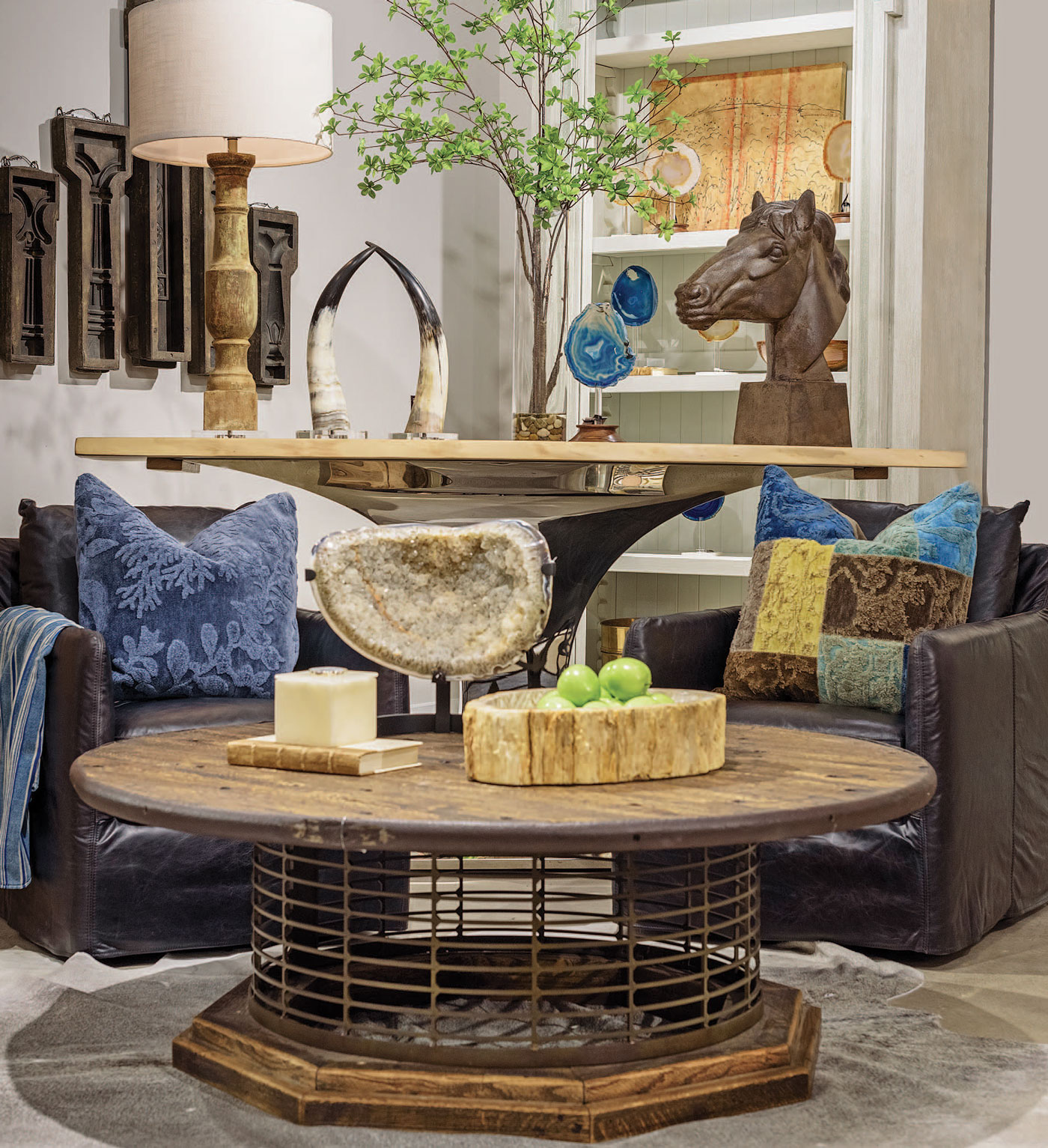
You can easily see how people who come into his orbit would hit it off and form fast friendships. It’s easy to get drawn in by Michael and whatever he’s selling. By the natural gregariousness, genuineness, and charm of his Lebanese heritage and Southern roots. And by his constant entertaining stories. Michael segues seamlessly from a recitation of a hilarious Robert Earl Keen song to reflections on how economic and political realities lead to fashion trends to an account of how he and Debbie ended up for a while in the jewelry business with inventory in dozens of big department stores.
“It was the mid- to late ’70s in a Nashville flea market. I was going back and forth from Nashville to Canton. It was the Friday night setup, and I saw a guy kneeling in the sawdust. People were raining down hundred-dollar bills. There were 70 to 80 wealthy, famous, and beautiful people trying to buy Indian jewelry from him. Turquoise jewelry was so hot. He had a suitcase-full straight from the Navajo reservation. I’m literally on my hands and knees helping him. I didn’t even know him, and I said, ‘Let me have $2,000 worth of stuff to try to sell.’ And he did — without knowing me. It turned out to be Mike Leverett, who would become a real mentor to me. He introduced me to people and mentored me in the jewelry business. Debbie and I got started selling jewelry to Dillard’s. Then we started our own costume jewelry line.”
Michael’s is the kind of conversation that makes you want to write out a place card for him at your dream dinner party. Take, for instance, the story about the sycamore logs. “One time I was driving down the road behind three truckloads of giant sycamore logs. I called my buddy and asked him where they were going. He said his sawmill. I said, ‘Turn around. I want ’em. And I bought ’em right off the highway. There was enough for 300 tabletops. It was $36,000 — and it was going to be five years before I could get anything out of them. That’s a lonesome feeling.”
Less lonesome once the wood’s been cured, cut, finely sanded, and meticulously finished into insanely stroke-able tabletops that will beautify 300 homes and, by extension, the lives of anyone who sits around them.
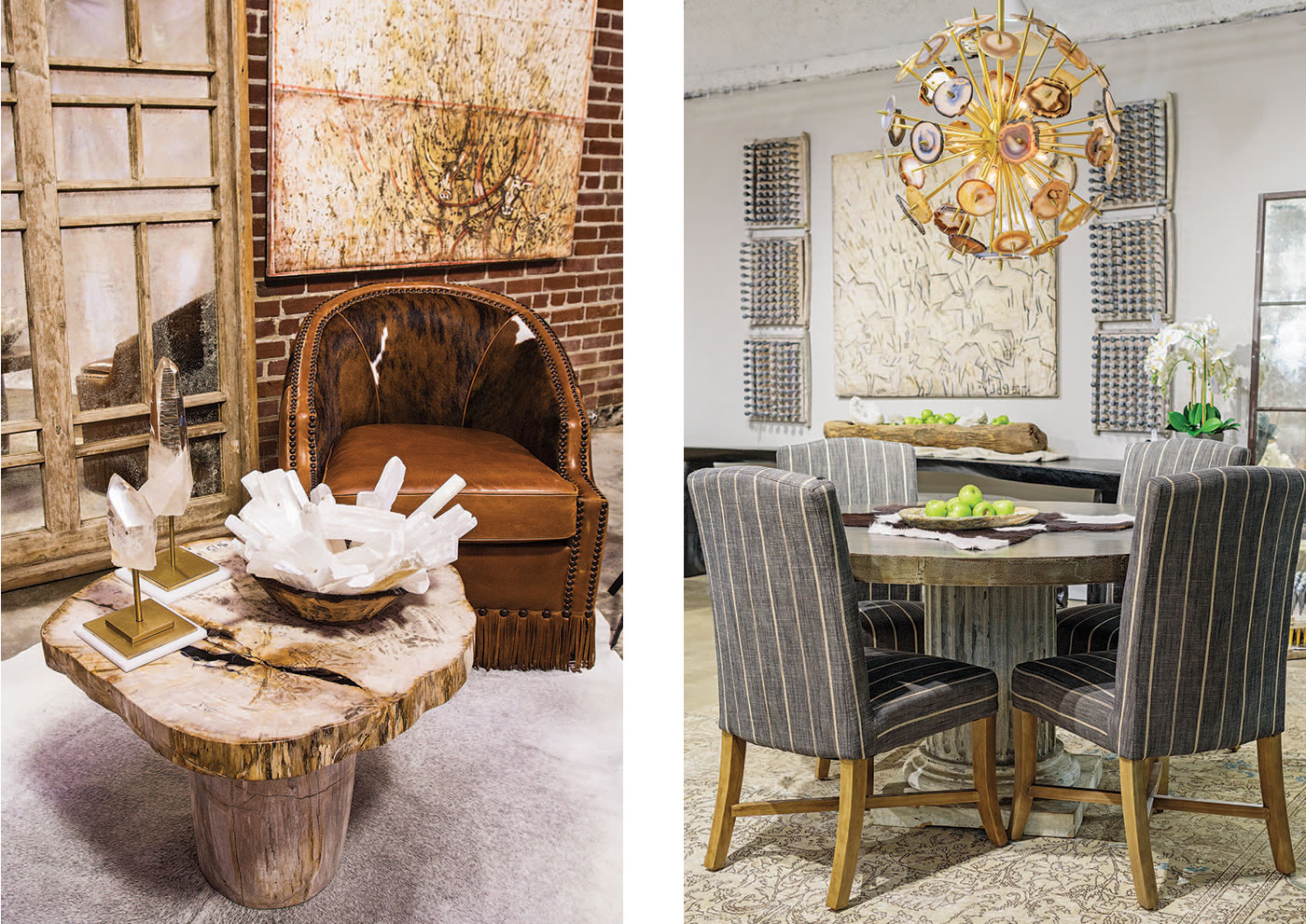
How those sycamore tabletops came into being — from wild hair on the highway to gorgeous items in the store — is just one of many examples of the teamwork that makes the vision real and the joy possible. “It’s a gleeful existence among us when we’re doing something good,” Michael says. “You can feel it. ... When we hit on something, it’s not really about the money at a certain point.”
Creating and picking, buying and selling — he wouldn’t do anything else. When he does take a break, he might go fishing at a quiet spot or golfing at Pebble Beach.
More often than not, though, Michael’s on the go, much to the affectionate frustration of daughter Mary, whose job is in part to keep track of him and his crazy schedule. From late September into early October she’ll be sure to find him in Round Top, when the fall antiques market is in high gear. Around Thanksgiving and Christmas, he’ll be found in Lake Village, baking 150 much-coveted loaves of bread, which he’s known for giving away. At 5 o’clock on any given day, you’ll find him adjourning for cocktails and camaraderie.
Right now he’s heading out into a sea of stuff to see what he can see. Immersed in it all, he’ll get high on the thrill of finding something special.
But that will have to wait for a bit. On his way out of the showroom, Michael is stopped by a woman and her young son. “Are you Paul Michael?” she asks. “I love your store in Canton!” She’s got a store of her own, she tells him. They happen to be standing beside what Michael tells her is his most versatile piece. “It’s our single bestseller,” he says, “expensive but a great value. It starts with a real antique cart that was originally used in factories before they had pallets. A customer actually helped design this.” We all stop to admire the terrific handles that really make the piece. “During the early days of travel, porters used to put your baggage on carts,” he says. “This is perfect for firewood!”
Caught up in the Paul Michael moment, the woman almost forgets why she stopped him in the first place. It’s not for an autograph — it’s for something more valuable: advice from Paul Michael.
“What’s the secret to longevity?” she asks earnestly.
Michael doesn’t hesitate for a second and answers with the sincerity and confidence of someone who was just born for this: “An honest deal,” he says. “There’s no substitute for an honest deal.”
Find out more about Market Hill and take a virtual tour at markethillroundtop.com, follow on Instagram @market_hill_round_top, and stop in during Antiques Week in Round Top, Texas, September 15 – October 7. Drop by the Paul Michael booth at the Nutcracker Market in Houston, November 9 – 12. Visit Paul Michael Company online at paulmichaelcompany.com.
From the October 2017 issue.












